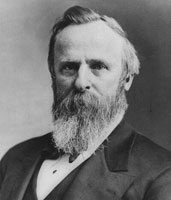Rutherford B. Hayes, Harvard Law School class of 1845, was the first and only other HLS alum to be elected president of the United States. Elected in 1876, Hayes was an unlikely political candidate, yet succeeded in helping to heal the country after the Civil War.
Born in Delaware, Ohio, Hayes attended Kenyon College and graduated at the top of his class in 1842. After reading the law in Columbus, Ohio, for a short time, he attended Harvard Law School.
Hayes details his time at HLS in his diary, and was quickly impressed with the education he was receiving.
“I have now finished my first week in the Law School. I have studied hard and am confident that my real gain is as great as I should have had in two weeks in an office,” he wrote.
While Hayes was at Harvard, slavery was one of the most important political questions facing the country. Hayes declined to take a stance on the issue at the time, and in his diary he even berated himself for not investigating this and other difficult legal questions. Instead, he wrote that he focused too much on literature, among other studies.
“What am I doing to prepare myself for the life struggle upon which I am soon to enter?” he wrote. “What training of the faculties have I submitted to, to give them that vigor which is needed to grapple successfully [with] the difficulties of the most trying profession known among men? Alas, to all these and a thousand similar questions which might be asked, I have but one answer. Nothing, nothing, absolutely nothing.”
After graduating from HLS, Hayes returned to Ohio, first practicing law in Lower Sandusky before moving to Cincinnati, where he became a successful lawyer. He developed an opposition opinion on slavery, which drew him to the Republican Party.
When the Civil War broke out, Hayes joined the Ohio Volunteer Infantry as a major. Seeing much active duty, he quickly rose to the rank of major general and was severely wounded in 1862.
Political life was not initially of interest to Hayes, yet he received the Republican nomination to Congress from Cincinnati in 1864. He refused to campaign, saying, “Any man who would leave the army at this time to electioneer for Congress ought to be scalped.”
Politics suited Hayes well—he went on to serve in two Congresses before being elected as Governor of Ohio for two terms.
Famous for his honesty and ability to not offend anyone, Hayes was a dark horse contender in the 1876 election after the scandal-ridden years of the Grant administration. Although he failed to win the popular vote, Hayes became the only President to be elected by a Congressional Electoral Commission due to several disputed votes in the Electoral College.
With Reconstruction still in full-swing, the Southern states remained occupied by the military and it was not clear whether those Electoral College votes should be considered. In the end, the Congressional Commission compromised with the Southern states in an agreement known as the Compromise of 1877. It was agreed that if Hayes was elected, he would pull troops out of the South, thereby ending Reconstruction.
During his presidency, Hayes sought to heal the nation’s wounds, which were still sore after the Civil War. He called for the protection of African Americans in their political, economic, and civil rights, and he worked to make business and industry stronger. He also initiated civil service reform aimed at ending patronage by appointing men with sound qualifications to government positions. And, Hayes signed a bill that allowed women to appear before the U.S. Supreme Court.
He made it known early on that he was only to serve one term, and retired to his home in Fremont, Ohio. He died in 1893 at the age of 70.
